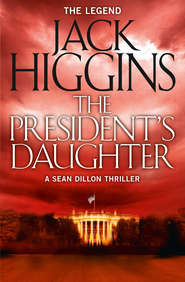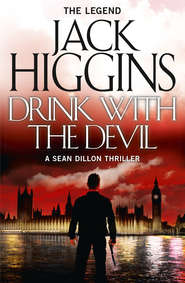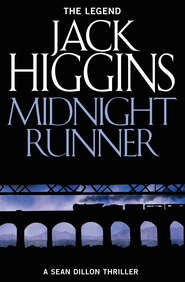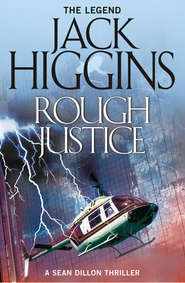По всем вопросам обращайтесь на: info@litportal.ru
(©) 2003-2024.
✖
The Iron Tiger
Автор
Год написания книги
2018
Настройки чтения
Размер шрифта
Высота строк
Поля
She listened to the sound of his footsteps fade along the narrow passage and then closed the door. She stood with her back to it, a slight frown on her face and then walked slowly across to the window.
The drumming was louder now, an insistent throbbing that filled the night and someone was singing in a high, reedy voice, hardly moving from one note to another, monotonous and yet strangely exciting.
She hurried across to the bed, opened her second suitcase and took out a sleeveless black dress in heavy silk that she had purchased in a moment of weakness in Saigon. She held it against herself for a moment in the mirror, and then smiled and started to dress. When she was ready, she pulled on a white linen duster coat against the night air, wound a silk scarf around her head and went downstairs.
The Hindu night clerk dozed at his desk, but came awake at once when she touched him lightly on the shoulder. ‘I want to go to the airstrip. Can you get me a tonga?’
‘Certainly, memsahib. Come this way.’
He took her out through the entrance and down the steps to the street. A light, two-wheeled tonga was parked at the kerb, a magnificent affair, a beautiful, high-stepping horse between the shafts, his brass harness gleaming in the lamplight.
The driver squatted on the pavement, chatting to an old beggar, but he sprang to his feet at once and ran forward. The Hindu desk clerk handed Janet in, gave the man his destination and then moved away.
The sky was scattered with the fire of a million stars, the moon so large that it seemed unreal like a paste-board cut-out. The wind blew in through the darkness carrying the last heat of the day across the river and she breathed deeply, wondering what the night might bring, her body shaking with a strange, nervous excitement.
The airstrip was half a mile outside Juma on a flat plain beside the river. It was not an official stopping place for any of the big airlines and had been constructed by the R.A.F. as an emergency strip during the war.
There was one prefabricated concrete hangar still painted in the camouflage of wartime, and the plane squatted inside, the scarlet and gold of its fuselage gleaming in the light of a hurricane lamp suspended from a beam.
Drummond leaned against a trestle table beside a wall-eyed Bengali merchant named Samil, Cheung’s agent in Juma, and watched two porters load the narrow boxes into the plane.
‘What’s in this one?’ he asked, kicking a wooden crate that carried the neatly stencilled legend Machine Parts, F. Cheung, Esq., Sadar, Sikkim.
Samil produced a bunch of keys, unfastened the padlock which secured the lid of the crate and opened it. He removed a mass of cotton waste and revealed a layer of rifles, each one still coated in grease from the factory.
Drummond took one out. It was a Garrand automatic, a beautiful weapon. He examined it closely and frowned. ‘What about this?’ He indicated the legend, United States Army on the butt plate. ‘A bit stupid, isn’t it? I don’t think our American friends would be amused.’
‘That’s what they sent me this time,’ Samil shrugged. ‘Surplus stock always comes cheaper, you should know that.’
‘Somehow, I don’t think Cheung is going to like it.’ He raised the Garrand, took an imaginary sight out of the door and stiffened suddenly as Janet Tate moved out of the shadows.
‘What in the hell are you doing here?’ he demanded.
‘I’m sorry,’ she said, her face serious. ‘Hamid’s gone off for the night. Before he left he called and told me you were out here. I thought you might like to take me to dinner or something.’
‘Exactly what I intended to do.’
The two porters had stopped working and glanced at Samil uncertainly. Drummond was still holding the Garrand in both hands, close to his chest and Janet said gravely, ‘Hamid said he thought you were loading motor spares.’
He put the rifle back with the others, wiped his hands clean on a lump of cotton waste and nodded to Samil. ‘You finish up here. Nothing to worry about. I’ll handle it.’
He turned, straightening his tie. ‘How did you get here?’
‘I came in a tonga from the hotel. I told the driver to wait.’
‘Shall we go, then?’
He took her arm, aware of the stiff restraint, the tilt of her chin and knew that in some way he had disappointed her. In the tonga she sat silently in her corner, as far away from him as possible and Drummond chuckled.
‘I’m sorry to spoil the image of the big bad gunrunner for you, but Ali knows damn well what I fly up to Sikkim in boxes labelled Machine Parts.’
She turned quickly in the darkness and he was aware of her perfume, delicate on the cool air.
‘So does everyone else including the Khan himself.’ He groped for her hand in the darkness and held it tight. ‘Look, I’ll tell you about it because it’s coming to an end anyway and because I don’t want my dinner spoiled. I’ve been looking forward to it.’
‘Go on,’ she said.
‘There’s a Chinese gentleman called Cheung up at Sadar. He’s been there for six or seven months now. He’s supposed to be a general merchant, but he happens to be an agent of the Chinese Nationalist Government on Formosa. He supplies the guns and I run them over the border into Tibet.’
‘To help Tibetan guerrilla fighters against the Communist government?’
‘Exactly.’
She reached over and touched his arm, the breath going out of her in a gentle sigh. ‘Oh, Jack. I’m so glad.’
‘Well that’s a hell of a thing for a clean living Quaker girl to say,’ he said. ‘And don’t go putting me on any pedestal. I do it for hard cash, not out of any political idealism.’
‘You don’t think the Tibetans stand any chance of winning then?’
He laughed harshly. ‘Not in a thousand years. Their battle will be won or lost in other places. Vietnam, Malaysia, Sarawak, perhaps on the floor of the United Nations. But to hell with that. Where would you like to eat?’
‘Somewhere full of colour, not just a tourist trap. I want to see the real India.’
‘Good for you. We’ll make a woman of you yet.’
They were moving into the centre of Juma now and he tapped the driver on the shoulder and told him to stop. ‘We’ll walk from here. You want to see the real India, I’ll show it to you.’
He paid the driver, took her arm and they moved along the street. As they neared the centre, it became busier and busier. Vendors of cooked food squatted inside their wooden stalls beside charcoal fires, busy with their pans, the scent of spices and cooked meats pungent on the cooling air.
And then they turned into the old quarter where lamps hung from the houses and the bazaar was even more crowded than during the daylight hours as people walked abroad to savour the cool night air.
The pavements were jammed with wooden stalls, overflowing with masses of paper flowers, shoddy plastic sandals imported from Hong Kong, aluminium pots and pans looking somehow incongruous and out of place.
Craftsmen sat cross-legged in their booths behind the stalls of the brass merchants, still plying their ancient craft next to the silversmiths and the garment-makers where they embroidered dancing girls’ clothes.
There were Bohara carpets, rugs from Isfahan and, at the far end, prostitutes waiting in their booths, unveiled and heavily painted, and even here the curtain of night, the flickering lamps shining on cheap bangles and jewellery, cloaked the filth and disease, the squalor of the daylight hours.
They moved on, Drummond pushing to one side the numerous beggars who whined for alms, and finally turned into a narrow, quiet street leading to the river. Faintly on the night air, Janet could hear music. It grew louder and then they came to a narrow arched door.
‘You wanted India? Well, this is it,’ Drummond said.
They went along a narrow passage and came out on to a small landing at the head of a flight of steps overlooking a large, square room. It was crowded with Indians, mainly men, most of them wearing traditional dress. They were all eating hugely and talking loudly at the same time.
In the centre on a raised platform, a young, womanish tabla player, eyes rimmed with kohl, beat his drums with an insolent skill, looking around at the crowd as he did so, a bored and haughty expression on his face. His companion, an older man in baggy white trousers, three-quarter length black frock coat buttoned to the neck, looked strangely formal and played the zita, his fingers moving across the strings with incredible dexterity.
A small, neat Hindu in scarlet turban, his eyes flickering towards Janet with frank admiration, approached with a ready smile. ‘A table, Mr Drummond? You wish to dine?’
‘A booth, I think,’ Drummond told him.











